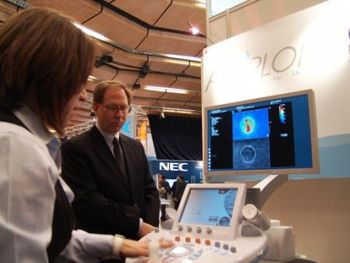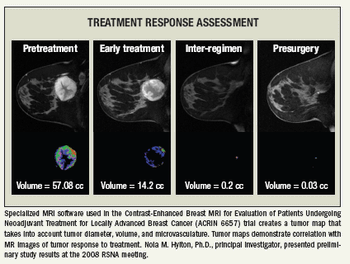
ACR prepares to launch mammo database next monthFDA clears attenuation correction softwareCarestream readies value-priced laser imager MedRad unveils informatics product

ACR prepares to launch mammo database next monthFDA clears attenuation correction softwareCarestream readies value-priced laser imager MedRad unveils informatics product

The American College of Radiology announced June 3 the creation of a national database that will allow mammography facilities to compare their practice performance and outcome data with other facilities.

FloSeal Matrix Hemostatic Sealant may stanch bleeding when other techniques fail, but it also spawns microcalcifications on digital or analog screening mammography that could lead to false positives for breast cancer, according to a case series collected by Loyola University radiologists.

Hologic shares tumble on poor 2QVolcano revenues rise, loss widens

Distrust of healthcare providers, cultural barriers, lack of information about the benefits of screening, or simply the need to cut corners might all contribute to the levels of compliance for breast cancer screening among minorities, including African American, Hispanic, and lesbian/bisexual women, recent studies show.

Other headlines:iCAD installs MR image analysis softwareZiosoft shows new capabilities in Japan

Breast cancer screening rates are declining,according to a recent study by the Centers forDisease Control and Prevention.

In a commentary on the mammography controversypublished in Diagnostic Imaging six and ahalf years ago,2 I discussed how two prestigiousgroups of scientists analyzed data from the eightmost commonly recognized clinical trials onscreening mammography conducted to date andarrived at opposite conclusions.


Other headlines:Siemens passes mammography milestoneMerge enhances mammography productSwissray nabs VA contract

It wasn’t too long ago that ultrasound was a roiling sea of innovation and new product releases, spurred by a rivalry among Diasonics, ATL, Hewlett-Packard (Agilent Technologies), and Acuson. Since these companies’ acquisition by GE, Philips, and Siemens, the waters have calmed. Supersonic Imagine plans to begin making some waves -- and soon.

Digital breast tomosynthesis was found to be superior to 2D digital mammography for determining tumor boundaries, a value at a time when more women with breast cancer are choosing breast conservation therapy, according to a study presented Friday.

Digital breast tomosynthesis was found to be superior to 2D digital mammography for determining tumor boundaries, a value at a time when more women with breast cancer are choosing breast conservation therapy, according to a study presented Friday.

Alternating two screening modalities pays off forwomen with high genetic likelihood of breast cancerAlternating MRI with mammographyevery six months picks up breastcancers missed when mammographyis performed alone for high-riskwomen.

Breast cancer screening rates among young premenopausal women are declining, according to a study on mammography use from the Centers for Disease Control and Prevention. Mammographers worry that the trend could lead to the erosion of screening services and of preventive care in general.

Siemens unveils single-head gamma cameraFDA approves new FFDM systems Varian readies proton therapy for EuropeGE schedules first installations of new PET/CT

Agfa sets sights on ECR 2009Carestream reaches milestoneFrench support ultrasound-guided therapy

The perceived threat of medical malpractice claims makes a bigger impression on radiologists than the actual risk of litigation warrants.

Hologic FFDM sales flattenVarian financials sizzleMR software firm lands $4MSNM streamlines review for new PET marker

Breast imaging remained a strongpoint of scientific research at the 2008RSNA meeting, with breast MRI playinga starring role but sharing the limelightwith tomosynthesis, positionemission mammography, and breastspecificgamma imaging.

Mammography is less certain than anyone would like. Comparing the accuracy of MR and x-ray mammography in women with dense breasts makes that clear. But there is another reason for greater concern, and it’s one I would have never suspected.

GE imaging orders nosedive in 4QNuance taps new VPQStar updates data management productsAtirix readies QC-Track software for Canada

The FDA has issued an advisory warning physicians and patients about potential health risks from topical anesthetic lidocaine used to reduce the discomfort of breast mammography.

One sure way to disappoint is to promise more than you can deliver. Mammography appears to be doing just that. A public survey conducted in Europe found that the vast majority of people hugely overestimate the life-saving benefits of breast and prostate cancer screening.

Digital mammography is at least as good as screen-film mammography for detecting breast cancer, according to a population-based screening program study presented at the RSNA meeting by Irish researchers.